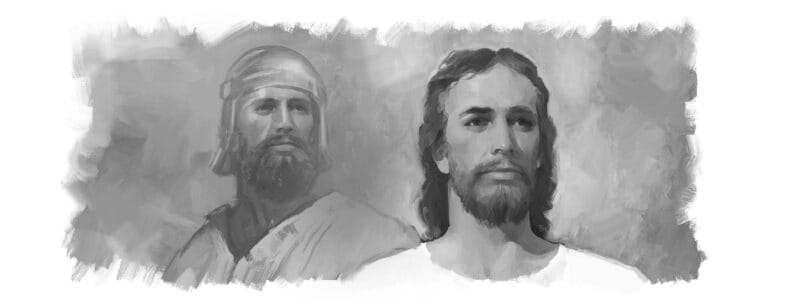 29 November 2025
29 November 2025
 BELIEVE HIS PROPHETS
BELIEVE HIS PROPHETS
 Daily Bible Reading
Daily Bible Reading
 Judges 16 – Samson’s Fall, Misery & Final Revenge
Judges 16 – Samson’s Fall, Misery & Final Revenge
 When strength breaks — and God’s grace grows again
When strength breaks — and God’s grace grows again
 Read online here
Read online here
 Introduction
Introduction
Samson is one of Israel’s most well-known judges — strong, undefeatable, anointed by God. Yet chapter 16 reveals a shocking picture: the man who once tore lions apart and carried city gates away falls through temptation, desire, and self-reliance. His strength was from God, but his heart was vulnerable. And still, his story does not end in failure alone — but with grace, return, and one final victory.
This chapter is a mirror: it shows how someone with great potential can fall deeply — and how God, despite failure, opens paths toward restoration.
══════════════════════════
 Commentary
Commentary
Samson enters Gaza — not as a hero, but searching, driven by desire. A prostitute, a secret night, a sleeping giant. The Philistines lie in wait to kill him, but at midnight he rises. With superhuman strength he tears the city gates from their posts, carries them away — a man empowered by God, yet walking in the wrong direction.
Then Delilah appears. No warrior, no Amazon — just words, touch, seduction. But words can be sharper than swords. The Philistine leaders promise her silver. She must learn the source of Samson’s strength. And she begins her work — gently, insistently, persistently.
Three times Samson deceives her. Three times she cries, “The Philistines are upon you!” Three times he snaps the bonds like threads. But Delilah does not relent — and Samson grows weary, unguarded. Day after day she presses him, until his soul is “vexed to death.” He opens his heart. He tells her what no one was meant to know: his hair — the sign of his Nazirite vow, the sign of covenant with God.
He sleeps in Delilah’s lap. Scissors whisper. A soft betrayal, deadly in its gentleness. Samson awakes, ready to fight again — but Scripture speaks one of its saddest lines:
“He did not know that the LORD had departed from him.”
Blinded, bound, humiliated — the strong man becomes a prisoner, a slave, grinding grain like an ox. The hero cycles endlessly — as his life had circled in compromise.
Yet in the darkness, something grows. Not muscle. Not fame.
His hair. A silent sign: God had not abandoned him.
During a festival to Dagon, they bring Samson out to entertain. A broken man before a laughing crowd. But inside, fire rekindles. Samson prays — not proudly, but humbly:
“Lord, remember me and strengthen me this once.”
He grasps two pillars. He pushes. The building collapses. His death destroys more enemies than his life had. Not a triumph of glory — but a final cry of faith, a last spark of covenant.
A man — fallen, shattered — but not forever lost.
══════════════════════════
 Summary
Summary
• Samson chooses desire over calling
• Delilah gains his trust and betrays him
• His hair is cut — his strength departs
• The Philistines blind and enslave him
• His hair grows back — a quiet sign of grace
• Samson prays once more for strength
• God hears — and Samson dies in a final victory
══════════════════════════
 Message for us today
Message for us today
Samson’s story is more than strength and defeat — it reflects us. We too may start strong and end weak. We carry gifts, calling, purpose — yet we lose them when we yield our hearts to compromise.
But: God watches over us even when we fall.
His grace grows quietly — like Samson’s hair.
No failure is final when a heart returns to God.
══════════════════════════
 Reflection
Reflection
 Where have I — like Samson — misused or neglected the strength God gave me?
Where have I — like Samson — misused or neglected the strength God gave me? What “Delilah” is weakening my calling, focus, or faith?
What “Delilah” is weakening my calling, focus, or faith? Where does God want new growth to begin — quietly but truly?
Where does God want new growth to begin — quietly but truly?
 What is my first step back to God today?
What is my first step back to God today?
~~~~~  ~~~~~
~~~~~

 27 – 29 November 2025
27 – 29 November 2025
 BELIEVE HIS PROPHETS
BELIEVE HIS PROPHETS
 Weekly Reading – Spirit of Prophecy
Weekly Reading – Spirit of Prophecy
 Ellen White | Patriarchs and Prophets – Chapter 44
Ellen White | Patriarchs and Prophets – Chapter 44
 Crossing the Jordan | How God Leads His People – Through Water, Signs, and Obedience
Crossing the Jordan | How God Leads His People – Through Water, Signs, and Obedience
 Read online here
Read online here
 BLOG 3 – The Miracle of the Jordan
BLOG 3 – The Miracle of the Jordan
 The River that Stood Still – Israel’s First Step into the Miracle
The River that Stood Still – Israel’s First Step into the Miracle
The Ark of the Covenant, twelve stones, and a new chapter in history
 Introduction
Introduction
The moment of transition has come. The Jordan roars in full flood—yet God’s presence already stands at the riverbank. What happens now will shape an entire generation.
══════════════════════════
 Commentary
Commentary
Morning lies over the camp like a holy breath. The priests lift the Ark of the Covenant onto their shoulders—the sign of God’s presence. The people keep a respectful distance, nearly a kilometer, so that everyone can see what God is about to do.
Then the priests begin to walk. Step by step. And the river roars against them. No path, no miracle—nothing yet.
Then the first foot touches the water.
In that very moment, the river stops.
Far upstream, the waters rise like a wall of glass. Downstream, they drain away. And suddenly a dry path lies open in the middle of the riverbed, solid as stone.
The priests walk further—right into the center of the Jordan. There they stand still, the Ark upon their shoulders like a glowing throne.
Israel passes through. Hundreds of thousands. Families. Animals. Soldiers. Carts. Children staring wide-eyed. Old ones weeping. Young men holding their breath.
They know: We are witnessing the Red Sea all over again.
Before the priests leave the river, each tribe takes one stone from the Jordan. Twelve stones for a memorial. Twelve stones for remembrance. Twelve stones for generations to come.
No sooner do the priests step onto the western shore than the waters rush back and the river flows again.
The Jordan continues—but Israel’s story has turned a page.
That same evening they celebrate Passover, eating from the grain of the land—and the very next day the manna ceases.
One era ends. A new one begins.
══════════════════════════
 Summary
Summary
Israel witnesses a miracle: the Jordan stops, the people cross through, and twelve stones remain as a memorial that God opens the way.
══════════════════════════
 Message for us today
Message for us today
Where God leads, He creates paths where none exist. And the miracles He gives are meant to be remembered.
══════════════════════════
 Reflection
Reflection
Which “Jordan moment” in your life is God calling you to step into—trusting His miracle before it happens?
══════════════════════════
LuxVerbi | The light of the Word. The clarity of faith.

 29 November 2025
29 November 2025 Daniel – Strong in Faith. Faithful in the Fire
Daniel – Strong in Faith. Faithful in the Fire Introduction to the Series
Introduction to the Series Introduction: When Faith Meets Character
Introduction: When Faith Meets Character Devotional
Devotional Thoughts for Your Heart
Thoughts for Your Heart What We Can Learn from Daniel
What We Can Learn from Daniel Practical Steps
Practical Steps Questions for Reflection
Questions for Reflection Prayer
Prayer Key Thought of the Day
Key Thought of the Day Blessing
Blessing ────────────────
────────────────
 (
(